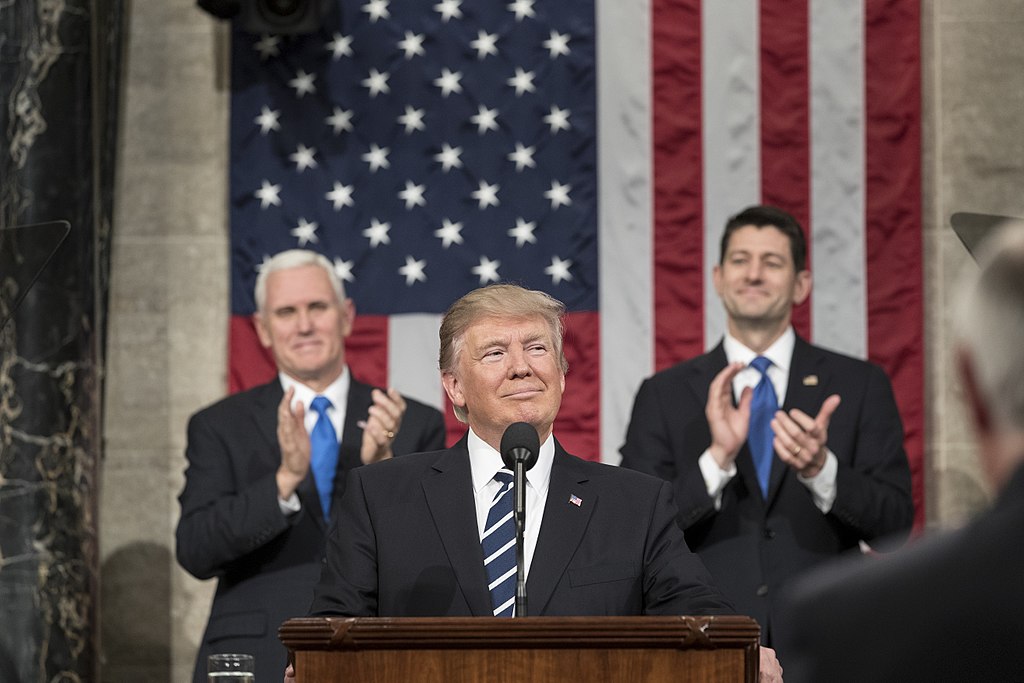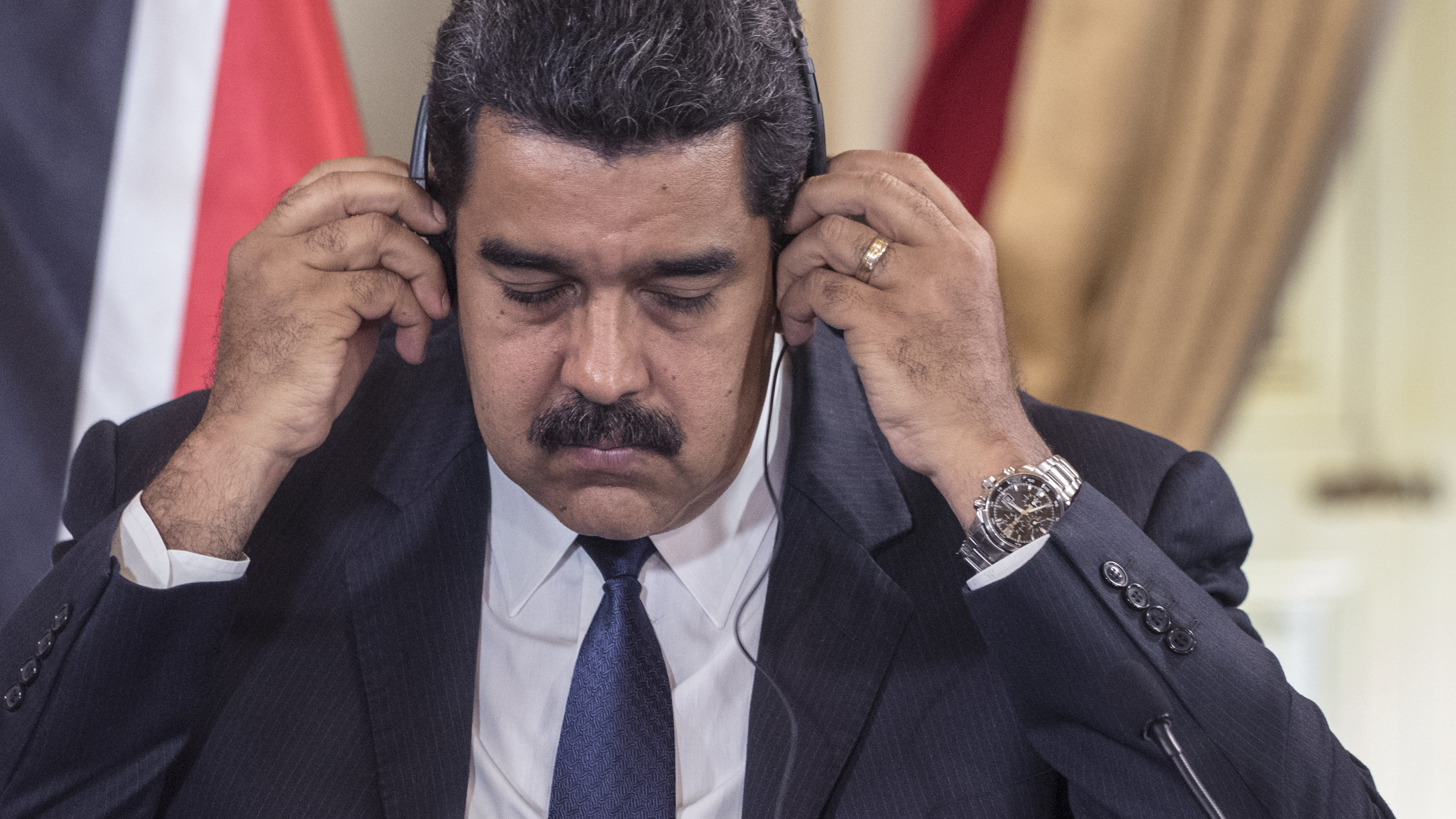The Legal Authority Behind Trump’s New Tariffs on Mexico
On May 30, the White House announced yet another new policy aimed at addressing the purported crisis of unlawful immigration across the U.S.-Mexico border. President Trump’s statement proposes a dramatic new strategy—putting tariffs on U.S. imports from Mexico unless and until Mexico takes steps to reduce illegal immigration into the United States:

On May 30, the White House announced yet another new policy aimed at addressing the purported crisis of unlawful immigration across the U.S.-Mexico border. President Trump’s statement proposes a dramatic new strategy—putting tariffs on U.S. imports from Mexico unless and until Mexico takes steps to reduce illegal immigration into the United States:
To address the emergency at the Southern Border, I am invoking the authorities granted to me by the International Emergency Economic Powers Act [(IEEPA)]. Accordingly, starting on June 10, 2019, the United States will impose a 5 percent Tariff on all goods imported from Mexico. If the illegal migration crisis is alleviated through effective actions taken by Mexico, to be determined in our sole discretion and judgment, the Tariffs will be removed. If the crisis persists, however, the Tariffs will be raised to 10 percent on July 1, 2019. Similarly, if Mexico still has not taken action to dramatically reduce or eliminate the number of illegal aliens crossing its territory into the United States, Tariffs will be increased to 15 percent on August 1, 2019, to 20 percent on September 1, 2019, and to 25 percent on October 1, 2019. Tariffs will permanently remain at the 25 percent level unless and until Mexico substantially stops the illegal inflow of aliens coming through its territory.
Trump has increased tariffs on products entering the United States from nearly every U.S. trading partner since becoming president. For these prior efforts, however, Trump relied on trade-specific statutory authorities, such as Section 232 of the Trade Expansion Act of 1962 and Section 301 of the Trade Act of 1974. Using the IEEPA, a law most commonly used to impose international economic sanctions, is a new approach.
As Stephanie Zable has explained for Lawfare, the IEEPA provides the president with certain extraordinary authorities that he may use to “deal with any unusual or extraordinary threat, which has its source in whole or substantial part outside the United States, to the national security, foreign policy, or economy of the United States, if the President declares a national emergency with respect to such threat.” Trump already took this latter step earlier this year when he declared the current situation at the U.S.-Mexico border to be a national emergency so that he could employ still other statutory authorities to secure funding for a border wall. Later, he vetoed a congressional rescission of this emergency declaration. While it remains unclear whether Trump will rely on this same emergency declaration for these tariffs—should they materialize—or issue a new one, the justification for the emergency is likely to remain largely the same.
The IEEPA allows the president to exercise wide-ranging authority in addressing such emergencies. In relevant part, it authorizes the president to:
(A) investigate, regulate, or prohibit—
(i) any transactions in foreign exchange,
(ii) transfers of credit or payments between, by, through, or to any banking institution, to the extent that such transfers or payments involve any interest of any foreign country or a national thereof,
(iii) the importing or exporting of currency or securities ... [;] [and]
(B) investigate, block during the pendency of an investigation, regulate, direct and compel, nullify, void, prevent or prohibit, any acquisition, holding, withholding, use, transfer, withdrawal, transportation, importation or exportation of, or dealing in, or exercising any right, power, or privilege with respect to, or transactions involving, any property in which any foreign country or a national thereof has any interest ....
The federal courts have interpreted this scope broadly. That said, this authority extends only to actions “by any person, or with respect to any property, subject to the jurisdiction of the United States[,]” which generally means within U.S. territory or subject to the control of U.S. nationals. Anyone who is subject to such restrictions and violates them may face both civil and criminal penalties, including up to 20 years in prison.
Since its enactment in 1977, the IEEPA has been used for a number of purposes, ranging from a diverse array of economic sanctions to the regulation of sensitive U.S. exports during lapses in relevant statutory authorities. But it has never been used to impose tariffs on imports. Here, the Trump administration is breaking new ground.
Nonetheless, there are a number of reasons the IEEPA may have been attractive to the Trump administration. The law allows the president to act far more quickly than most other statutory delegations related to tariffs. For example, Sections 232 and 301 both require extended investigatory processes before any tariffs can be imposed. And neither of those two statutes is necessarily well positioned to permit this tariff action on the basis elaborated by the president in his statement. Section 232 grants the president authority where particular imports threaten U.S. national security. And Section 301 permits action in response to an act, policy or practice by a U.S. trading partner that burdens or restricts U.S. commerce. The IEEPA lets the president avoid these agency determinations entirely.
There is also some precedent for using IEEPA-like authorities to impose tariffs. In 1971, President Nixon used emergency powers provided to him by the Trading with the Enemy Act (TWEA), a predecessor to the IEEPA, to impose a 10 percent tariff on all imports to the United States for several months in response to an ongoing economic crisis. When his authority to do so was later challenged, the U.S. Court of Customs and Patent Appeals (CCPA)—a now-defunct federal appellate court that was later incorporated into the U.S. Court of Appeals for the Federal Circuit—ultimately ruled in his favor in United States v. Yoshida International, Inc. The Yoshida court looked first to the plain language of the TWEA, which empowered the president to “regulate ... importation” “by means of instructions, licenses, or otherwise[.]” The court interpreted this language as a broad delegation of authority, one that authorized the president to regulate imports in any manner that Congress itself could pursue, including the imposition of tariffs. Moreover, as Congress authorized such uses only in response to emergencies, the court also found that the TWEA provided an “intelligible principle” that prevented it from being an unconstitutionally overbroad delegation of authority under the nondelegation doctrine. The following year, the court relied on Yoshida to reach the same conclusion in the similar matter of Alcan Sales v. United States, and the plaintiffs’ subsequent petition for certiorari was denied by the Supreme Court.
Whether Yoshida applies to the present situation is an open question. The IEEPA was modeled directly on the TWEA, and federal courts routinely cite TWEA precedent like Yoshida in adjudicating IEEPA matters. Moreover, while narrower in certain respects, the IEEPA still gives the president the authority to “regulate … importation” “by means of instructions, licenses, or otherwise,” as the TWEA did. There are differences between the two statutes and the contexts of their applications, but it’s not clear whether these differences provide a basis for distinguishing Yoshida to reach a different conclusion about the current situation.
Regardless, various affected parties are almost certain to challenge the Mexico tariffs in court. Some such challenges may be premised on whether the IEEPA can in fact be read as authorizing the president to levy tariffs, and to which products and parties any tariff authority may extend. Others may take issue with the validity of Trump’s emergency declaration, which is already being litigated in the context of the border wall. And still others will likely question whether the IEEPA is consistent with the nondelegation doctrine.
This line of argument, ironically, would dovetail with an ongoing challenge to Trump’s tariff action under Section 232. American Institute for International Steel v. United States is currently pending possible review by the Supreme Court after a three-judge panel of the U.S. Court of International Trade rejected the plaintiffs’ argument that Section 232 is unconstitutional because, the court found, that argument was foreclosed by Supreme Court precedent holding that Section 232 is “clearly sufficient to meet any delegation doctrine attack.” One judge, however, wrote dubitante to suggest that this conclusion should be revisited in light of the “unbridled discretion” the Trump administration appeared to be exercising. And the Supreme Court seemed at least open to nondelegation doctrine challenges during recent oral arguments in another unrelated matter, Gundy v. United States. Hence there might be some opening for a similar challenge to the president’s use of the IEEPA, even though such efforts have generally failed in the past.
Trade lawyers, meanwhile, will have additional questions, including how Trump’s announcement could be consistent with international trade rules under the North American Free Trade Agreement (NAFTA) and the World Trade Organization (WTO). If Mexico were to invoke those rules and begin dispute settlement proceedings, the Trump administration would likely need to invoke once again the national security exceptions in those agreements. Moreover, the broad strokes laid out in the White House statement leave many relevant practical variables unexplained. For example, when the president refers to “all goods imported from Mexico,” does he mean products for which Mexico is their “country of origin” consistent with NAFTA rules? Or something else? These answers will have to wait until the Trump administration spells out its intended policy in greater detail.
Even more immediate is the concern about the impact of this move on the entry into force of the U.S.-Mexico-Canada Agreement (USMCA), which the Trump administration has been negotiating as a replacement to NAFTA. Just hours before Trump’s tariff announcement on May 30, Mexican President Andrés Manuel López Obrador sent the USMCA to the Mexican Senate for ratification—a step made possible by the recent lifting of Section 232 tariffs on steel and aluminum imported from Mexico and Canada. Now it is more unclear than ever whether the agreement will advance. Trump’s actions are equally likely to complicate passage of the USMCA in Canada, which similarly introduced ratification legislation last week. After all, like the original NAFTA, the point of the USMCA is to eliminate tariffs on goods flowing between the United States and its North American trading partners, not to raise them. Trump’s potential Mexico tariffs run directly contrary to these commitments.
The president’s statement is also triggering strong reactions in Congress. Several legislators—including senior members of Trump’s own party, like Sen. Chuck Grassley—have condemned the new tariffs as an abuse of relevant statutory authorities and warned the White House that its Mexico tariffs may sink the odds of passing the implementing legislation for the USMCA. If it wishes to oppose Trump’s actions, Congress could try to rescind the related emergency declaration using expedited procedures provided by the National Emergencies Act (NEA), which would make the IEEPA unavailable to the president in this context. Alternatively, Congress could enact new legislation that amends the IEEPA to prevent it from being used in such a way. Grassley has already indicated that he intends to advance legislation aimed at curbing the president’s tariff authority under Section 232 alongside Republican Sens. Pat Toomey and Rob Portman, which is just the latest in a raft of similar legislation. A measure narrowing the IEEPA might be a logical next step.
That said, Trump is likely to veto any effort to rescind his national emergency or narrow the IEEPA, unless Congress can somehow incorporate it into broader legislation that would be difficult for the president to oppose. And it is not clear whether any such effort could muster the two-thirds support necessary in both chambers of Congress to override Trump’s veto.
For its part, the Trump administration has sought to project confidence in its new policy. “[The IEEPA] gives [the president] much broader authority than he’s even taking on this front,” White House Press Secretary Sarah Huckabee Sanders said when asked about the law. “There’s case law that supports it.” In fact, the legal basis for this latest Mexico policy is far from clear. Instead, like many of the Trump administration’s recent policies, the Mexico tariffs test the outer limits of the president’s legal authority—terrain that Congress and the courts may yet choose to reclaim.





